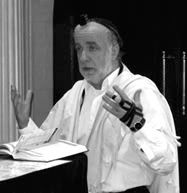 Parashat Va'era covers the first seven of the ten plagues. By examining the structure of the plagues, something unique emerges:
Parashat Va'era covers the first seven of the ten plagues. By examining the structure of the plagues, something unique emerges:Plague 1-- Blood: Hashem commands Moshe to wait for Par'o early in the morning on the banks of the river Nile to warn him that the plague is coming.
Plague 2--Frogs: Hashem instruct Moshe to go to Par'o, presumably to the royal palace.
Plague 3--Lice: Hashem tells Moshe to initiate the plague without any warning whatsoever.
This pattern repeats itself twice more. Moshe waits for Par'o on the bank of the Nile in order to announce the forth plague, wild animals. He goes to Par'o to inform him of the fifth plague, pestilence. The sixth plague, boils, is visited on the Egyptians without notice. Plagues seven, eight and nine follow the same template.
What is the significance of this unmistakable structure? In the sixteenth century, The Maharal of Prague suggested that the pattern of warning and lack of warning reflected Moshe's God directed psychological warfare against Par'o. Initially, Moshe treated Par'o with respect, patiently waiting for him by the river. Next, Moshe acted more assertively, approaching Par'o when he saw fit rather than waiting for him. Finally, he showed Par'o no regard at all, striking Egypt without informing Par'o in advance.
Another explanation maybe offered. The Torah is showing us how negative patterns of behaviour, what we might term "inner plagues"can creep up on us. They begin by waiting patiently; next, they tempt us more directly; ultimately, they become second nature, reflexes which strike without warning and determine our conduct.
The Babylonian Talmud, Succah 52b, powerfully describes this process:
"Rava said: Initially the Evil inclination is called "wayfarer" then it is called "guest", and finally it is called "master".
This is what happens to Par'o in our Parashah. The movement from warning to no warning concerning the plagues mirrors the shift in Par'o psyche. Initially, Par'o hardens his own heart and refuses to release the Jewish People from slavery. Ultimately, as the text of the Torah indicates, God hardens Par'o's heart. Maimonides, in the sith chapter of Hilchot Teshuvah,(Laws of Repentance) among other sources, explains that God took away Par'o's ability of free will as punishment for all the transgressions he had committed when he had free will. According to the line of thought we have been developing, there is no mystery about how God takes away Par'o's free will. Par'o becomes caught in a downward moral spiral, held hostage by his own previous actions and attitudes. He becomes so used to defiance of God and indifference to Israelite suffering that no other mode of behaviour is possible for him any longer.
This kind of negative spiritual dynamic is a danger of which sensitive human beings are aware. The good news is that there is another side to the coin. Positive, upward spiritual momentum is equally possible. Compassion and ethical behaviour can become instinctive. As Hahamim said in Pirke Avot "Avera goreret avera" one sin tends to bring another in its wake. Yet it is also the case that "Mitzva goreret mitzva" one mitzva often pulls another along behind it. (taken from Limmud insights
No comments:
Post a Comment